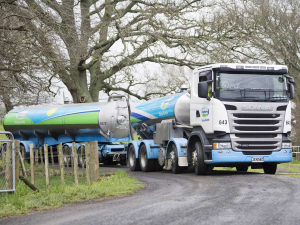Fonterra’s exit from Australia ‘a major event’
Fonterra’s impending exit from the Australian dairy industry is a major event but the story doesn’t change too much for farmers.
 Fonterra remains on track to return $1 billion to farmer shareholders and unit holders within two years.
Fonterra remains on track to return $1 billion to farmer shareholders and unit holders within two years.
Fonterra's plan to return $1 billion to farmer shareholders and unit holders within two years remains on track.
This is despite the co-op shelving plans to offload part of its Australian business.
Fonterra chief executive Miles Hurrell says the co-operative remains committed to the capital return.
But he adds that things will depend on the co-op’s debt position and the how much the Soprole business in Chile will fetch.
As part of its strategy to 2030, Fonterra set a goal of a return of about $1 billion to shareholders and unitholders from divestments including Soprole and a stake in the Australian business.
But after looking at options, Fonterra has decided to maintain full ownership of the Australian business.
Australia plays an important role in our consumer strategy with a number of common and complementary brands and products and as a destination for our New Zealand milk solids,” says Hurrell.
“The business is going well, and it will play a key role in helping us get to our 2030 strategic targets.
“Even though we have decided not to sell a stake in our Australian business, we are still committed to targeting a significant capital return to our shareholders and unitholders.
“The amount of any capital return will ultimately be determined on a number of factors, including the successful completion of the divestment programme as well as our ongoing debt and earnings levels.”
Voting has started for the renewal of DairyNZ's milksolids levy.
The most successful catchment groups in NZ are those that have 'a source to sea' approach.
Associate Agriculture Minister and Manawatu dairy farmer Andrew Hoggard says the free trade agreement (FTA) negotiated with India is not a bad deal and his party, Act, will support it when it goes before Parliament.
Newly released data from Environment Canterbury (ECan) Farm Environment Plan (FEP) audits are showing a dramatic lift in environmental performance across the region.
A solid recovery of global dairy prices this year makes a $9.50/kgMS milk price almost a shoo-in for this season.
As New Zealand marks the United Nations’ International Year of the Woman Farmer 2026 (IYWF 2026), industry leaders are challenging the misconception that women only support farming.

OPINION: Here w go: the election date is set for November 7 and the politicians are out of the gate…
OPINION: ECan data was released a few days ago showing Canterbury farmers have made “giant strides on environmental performance”.